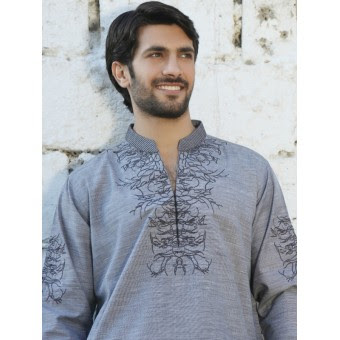Latest Mens Shalwar Kameez Fashion In Pakistan Definition
Source(google.com.pk)
Men all over Pakistan prefer shalwar kameez with some additional accessories which include Pakistani Waistcoat, Achkan and Sherwani with the shalwar kameez or with Churidar Pajama. Jinnah Cap also called Karakul, Fez also called Rumi Topi and Taqiyah (cap) is used with Shalwar Kameez. Khussa is a popular foot wear with shalwar kameez. Men like to wear traditional shawls made of Pashmina or other warm materials especially in Northern part of the country.The shalwar kameez is the national dress of Pakistan and is worn by men and women in all four provinces Punjab, Sindh, Baluchistan, Khyber Pakhtoonkhwa and FATA in the country and in Azad Kashmir. Each province has its own style of wearing the Shalwar Qameez.Pakistanis wairclothes range from exquisite colors and designs to the type of fabric (silk, chiffon, cotton, etc.).The term Pakistani clothing refers to the ethnic clothing that is typically worn by individuals in the country of Pakistan and by the People of Pakistani descent. Pakistani clothes express the Culture of Pakistan, the Demographics of Pakistan and regional Cultures which include Punjabi culture, Sindhi culture, Balochi culture, Pashtun culture and Kashmiri culture. Dress in each regional culture reflect weather conditions, way of living and distinctive style which gives it a unique identity among all cultures.Pakistani dressing has similarities with Indian dressing because of pre-partition culture which was shared by these nations for thousand years but the religious factor was always there which makes a difference. Traditional Pakistani dressing also shares similarities between the ethnic groups of central Asia and ethnicities of the Iranian plateau such as the Turkic ethnic groups (i.e. Khazakhs, Uzbeks, Turkmens) and Iranic ethnic groups (Tajiks, Khorasani Persians and Pashtoons), that have been separate from the cultures of modern day Pakistan during the Durand agreement between Afghanistan and the British raj.
With the passage of time Pakistanis are adapting modern dress and cultural clothing, especially in big countries.In regional clothing, Balochi people wear shalwar kameez of thick cloth with very wide shalwar to prevent themselves from the hot wind of dry Sulaiman Range and Kharan Desert. They wear Balochi turban made of a very long cloth, often in white color to prevent their head from sun rays.Sindhi people wear shalwar kameez with traditional Sindhi cap and Ajrak of beautiful designs which are made locally.Punjabi men wear simple shalwar kameez, Kurta Shalwar and Dhoti kurta according to Punjabi climate. Turban of a thin cloth is also used with Shalwar Kameez especially in rural areas of Punjab where it is called Pagri. Khussa is also used with Dhoti Kurta. In Pashtun dress, people wear traditional Peshawari Chappal[2] in feet and Pakul with Shalwar kameez. Kashmiri people use Pheran, Shahmina, Shahtoosh and Jamavar which makes them warm in the cold climate of Kashmir.Women's clothingPakistani Model displaying Traditional Dress in a Fashion Shalwar kameez
The most favorite dressing among Pakistani women is shalwar kameez which is worn in different styles, colors and designs especially the front part of kameez is decorated with different styles and designs of embroidery. It is worn with different sleeve length, shirt length, necklines and different types of shalwars like patiala salwar, churidar pajama and simple trouser. Kurta is also worn by women in latest designs. Dupatta is an essential part of shalwar kameez and considered a symbol of woman's respect.It is used with different embroidery designs of Kamdani and Gota.Other traditional dresses
Pakistani women have variety of traditional dresses other than Shalwar Kameez but they mostly wear them in special occasions like Wedding, Engagement, Mehndi and other traditional ceremonies. Among these dresses Saris are very popular and its each design and color seems unique from the other e.g. Lehenga Style Sari. Lehenga is another popular dress which resembles with skirt but a typical traditional dress. Gharara and Sharara are two resembling dresses which are often used in ceremonies. Farshi Pajama is an old traditional dress which is worn occasionally. Laacha is worn in Eastern part of the country, its a dress which resembles with Dhoti from its lower part.
In regional clothing, Balochi women wear heavy embroided Shalwar Kameez and Dupatta according to the weather conditions. They wear Kameez full of heavy Embroided Shisha work. Sindhi costumes have different styles of embroidery and some women use Ajrak as Dupatta. these women also wear bangles in their traditional way. Punjabi women prefer light embroidery on simple Shalwar Kameez or Kurta. Traditional Lacha and Bangles are also used. Paranda is the special traditional, colorful and unique Punjabi item which is used to tie the hair. Pathan women wear embroided Kameez with a farak with a heavy Dupatta.
Latest Mens Shalwar Kameez Fashion In Pakistan


Latest Mens Shalwar Kameez Fashion In Pakistan

Latest Mens Shalwar Kameez Fashion In Pakistan

Latest Mens Shalwar Kameez Fashion In Pakistan

Latest Mens Shalwar Kameez Fashion In Pakistan

Latest Mens Shalwar Kameez Fashion In Pakistan

Latest Mens Shalwar Kameez Fashion In Pakistan
.jpg)
Latest Mens Shalwar Kameez Fashion In Pakistan
.jpg)
Latest Mens Shalwar Kameez Fashion In Pakistan

Latest Mens Shalwar Kameez Fashion In Pakistan

No comments:
Post a Comment